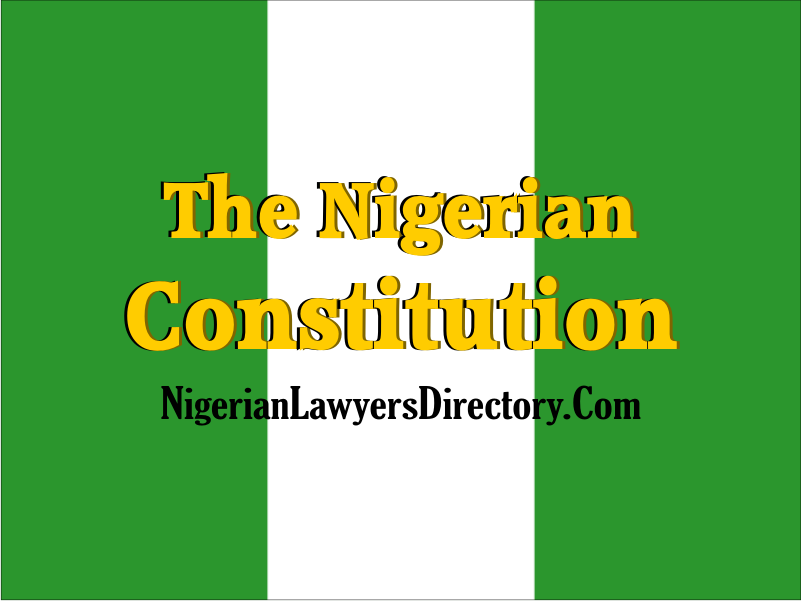Constitution Of The Federal Republic Of Nigeria 1999 With Amendments Or Alterations (Nigerian Constitution)
Free Access To The Nigerian Constitution Project: A Nigerian Lawyers Directory Citizen Legal Education Programme (CLEP)
This Free Access To The Nigerian Constitution Project aims to provide free access to all the sections and parts of the the Constitution of the Federal Republic of Nigeria 1999. It is an active work in progress, as sections of the Constitution are being published one after the other, progressively. This progressive publishing approach to the Nigerian Constitution will help those who have subscribed to free email alerts of the Nigerian Lawyers Directory to read each published section gradually, as they receive fee notification of the publication of every section.
The concept of citizen legal education (CLE) derives its importance from the application and consequences of the legal doctrine of ignorantia juris non excusat (also referred to as ignorantia legis non excusat). The ancient and modern Latin maxim or expression simply means “ignorance of the law is not an excuse” for violating any law, “ignorance of the law does not excuse” or “ignorance of the law excuses no one”.
The Nigerian Citizen Legal Education Programme (CLEP), one of the free legal initiatives of Dr. Leesi Ebenezer Mitee, is therefore necessary to help all members of the Nigerian society to understand the basic principles of the laws that govern their conduct and activities, including the Nigerian Constitution. It will also help people and organisations all over the globalised world.
The Nigerian Constitution As The Grundnorm In The Nigerian Legal System
According to Dr. Leesi Ebenezer Mitee, “Obviously, the Constitution of the Federal Republic of Nigeria is the Grundnorm under any civilian administration. It is the ultimate principle according to which all other legal norms in the State are established, receive or lose their validity. This claim is beyond controversy, as it is fortified by section 1 of each of Nigerian constitutions since Independence: 1960, 1963, 1979, and 1999. In addition, the ill-fated Constitution of the Federal Republic of Nigeria 1989 (which was to have come into effect on 1 October 1992) declared its supremacy in section 1 thereof:
(1) This Constitution is supreme and its provisions shall have binding force on all authorities and persons throughout the Federal Republic of Nigeria.
(2) The Federal Republic of Nigeria shall not be governed, nor shall any person or group of persons take control of the Government of Nigeria or any part thereof, except in accordance with the provisions of this Constitution.
(3) If any other law is inconsistent with the provisions of this Constitution, this Constitution shall prevail, and that other law shall to the extent of the inconsistency be void.
Leesi Ebenezer Mitee stated further:
“The correct status of the Constitution as the Grundnorm was succinctly declared by Justice Karibi-Whyte in Musa v Hamza (1982) 2 NCLR 229 at 250 (Court of Appeal) thus:
“It is a document containing the fons et origo (i.e. the source and origin) of the laws and rights of its people. It is in a sense what in Kelsenian terminology may be regarded as the Grundnorm of the State. The Constitution is therefore aptly described as the supreme law of the land. This is because it is a law, which does not depend upon any other for its validity.
“He reiterated this same point at the Supreme Court in Adigun v Attorney-General of Oyo State (1987) 4 SC 272 at 344 and Labiyi v Anretiola (1992) 8 NWLR (Part 258) 139.”
Source: Leesi Ebenezer Mitee, Nigerian Legal System: A Fundamental Approach, Volume I (Ebenezer Printing & Publishing House 2001) 66.

























